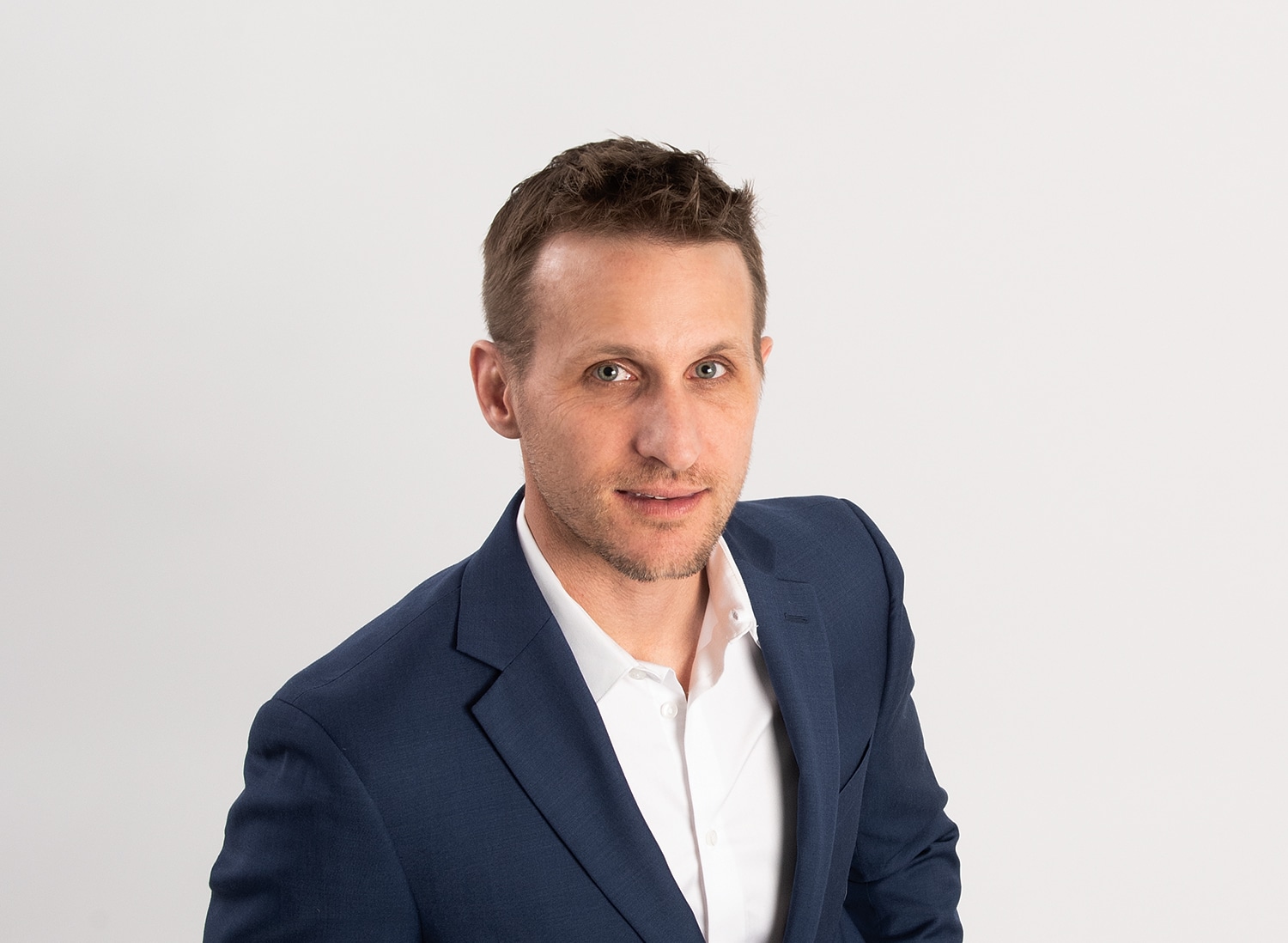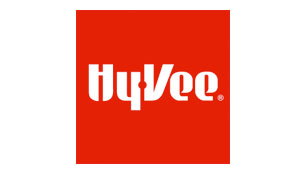Meet three startups in Iowa centering sustainability in their solutions

Sarah Diehn Mar 15, 2024 | 6:00 am
13 min read time
3,012 wordsAg and Environment, Energy, Innovation and EntrepreneurshipSustainable solutions are a form of innovation. They often birth new technologies, ideas, mindsets and behaviors that differ from how consumers and businesses have traditionally interacted with the environment.
With agriculture as one of Iowa’s key industries, the state is capable of launching and attracting startup companies that diverge from the status quo to further sustainability in Iowa and beyond.
The Business Record reached out to the leaders of three startups based in or working in Iowa — Bristola, Midland Co. and Pivot Bio — working in wastewater treatment and renewable energy, aquaculture and crop nutrient technology, respectively. They each shared their company’s story and how they built technologies with sustainability in mind.
Their emailed responses have been lightly edited for clarity and length.
Bristola: Jared Burma, founder and CEO
Bristola was founded in 2019 by Jared Burma to create a safer and more efficient way to clean liquid storage facilities, such as wastewater treatment facilities and anaerobic digesters, which are tanks where microorganisms break down biodegradable material in the absence of oxygen. The digesters are used in industrial and agricultural settings to manage waste and produce fuel. The technology startup is headquartered in Des Moines.
Why was Bristola started and what problem is it working to address?
Bristola was started after a near-death experience during an anaerobic digester cleanout. The maintenance of the anaerobic digester facility had been neglected over time. During the anaerobic digester cleanout process, the major sediment wall fell in on me and my team while performing manual cleaning work inside the digester. This near-death experience propelled me to change the normal clean-out process and create a better solution for this type of work to promote proper maintenance and operations. The Bristola patented solution is working to address improper operations of anaerobic digesters in the wastewater and renewable energy sector.
Explain Bristola’s solution or technology and how it works.
Bristola has created a patented solution to clean confined space tanks, including anaerobic digesters, while they remain operating through a manhole at ground level. This system attaches to the Bristola gate valve placed on the manhole, equals the pressure in the tank and then deploys a remote-operated vehicle (ROV) for sediment removal and processing. The processed liquid is then placed back in the tank to keep it at proper operating levels and to cause as little interruption to daily operations as possible.
What makes Bristola’s solution sustainable? What effects does it have on sustainability in Iowa and beyond?
Bristola’s technology provides the only solution to clean out liquid tanks, especially anaerobic digesters, while they remain operating. The Bristola process eliminates the carbon dioxide release that comes with taking a digester offline and opening it for cleaning. It also keeps these tanks at operating capacity year after year, allowing for them to function properly, reducing the unrealized methane release that happens when retention time is affected by solids buildup. This sustainable clean-out solution allows digesters to function properly, promoting success and bringing new investments into the industry, which eliminates waste disposal issues and promotes green energy for the consumption of rural and under-provided communities in Iowa and other states.
What has Bristola’s growth looked like since its founding?
We have been averaging 300% growth year over year since our founding in 2021.
What is a challenge or outside factor that affects your company as a startup?
“The norm.” It has proven to be a major hurdle to get companies to understand they do not have to do something just because that was how it had been done for the previous decade or longer. Most companies want to be second at everything but first at nothing, and so it has been a major hurdle to get these companies to understand the benefits of our technology as well as the risks that have been mitigated. We spend most of our time educating our potential customers.
In your experience, what have you found are important factors to consider or resources to starting and building a company in Iowa?
The main factor to starting and building a business from scratch with brand-new technology is a partner/investor that has a long-term vision and can and will help with financial swings through the early years. We found that in the financial environment we are in today, most traditional banks are not willing to be that partner so finding a private party is really the biggest factor, in my opinion, to be successful. Second is a great marketing partner to help with promoting and educating something new that has not been done. I always say you cannot buy something you do not know about, and the most efficient method is to use a proper marketing scheme to reach as many people in the most effective way. Finally, building a company takes lots of patience and persistence. As I was once told, it will take twice as long and cost twice as much, but in today’s environment, it will be four times as long and cost four times as much as one might think.
Do you see barriers to prioritizing sustainability as a business or starting a business with a sustainability focus? If so, what are they?
The main barrier is that some smaller companies do not have the budget or capacity to be sustainable in today’s environment. We have tried to accommodate that by keeping pricing competitive and showing these potential customers that we are an asset, not an expense, and that we can increase their bottom line, at which time they start to listen. Second, there is still some hesitancy with many potential customers because they have been sold and burned in the past on “sustainable” products only to see them not work and cost them much more than anticipated.
What is an area of focus for Bristola or an opportunity it hopes to build on in the near future?
Bristola is focused on creating renewable gas production through proper utilization of anaerobic digesters converting organic waste streams into sustainable energy. This is done through the ability to build and operate these systems at a viable cost, which is being exploited today. This market has been saturated with extremely over-complex and pricey technologies and approaches, which in return sets these facilities up for failure.
What do you think stakeholders in Iowa can do to foster a sustainability focus long-term?
Promote clean energy consumption, reuse of organics instead of landfilling, proper maintenance and operations programs for anaerobic digesters, low-cost financing for sustainable technology, guaranteed bank-backed financing, more educational programs on sustainability technology and projects.
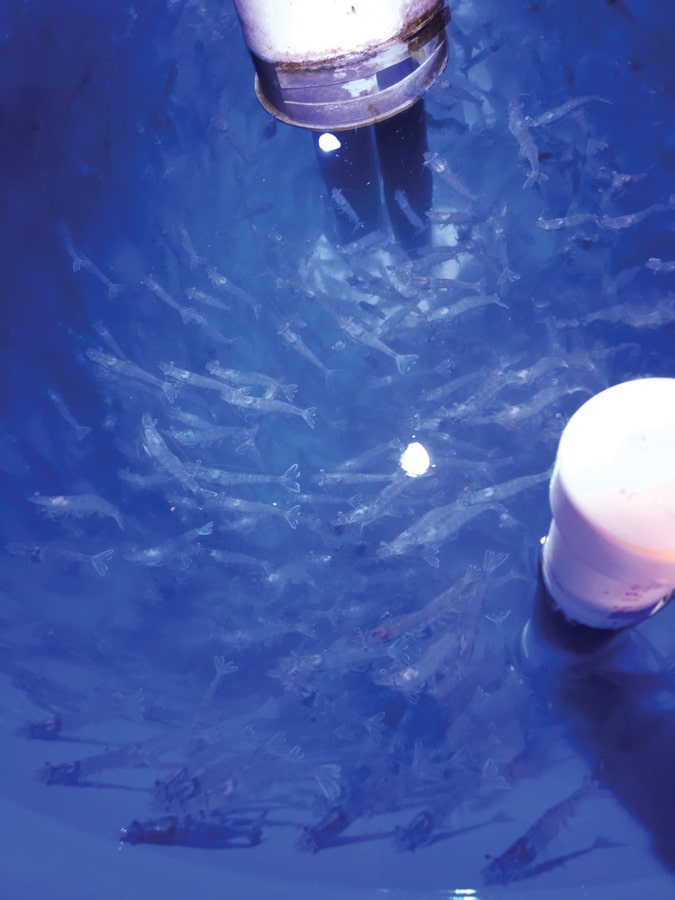
Shrimp swim in one of Midland Co.’s algae-based recirculating aquaculture
systems at the company’s facilities near Ames. Submitted photo
Midland Co.: Jackson Kimle, founder and president
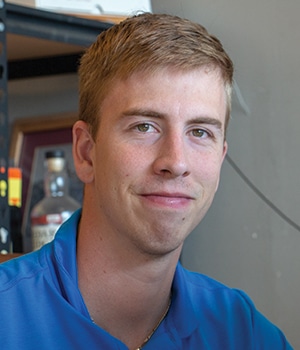
Ames-based Midland Co. is working to bring shrimp and fish production, known broadly as aquaculture, to the landlocked state of Iowa to increase accessibility to seafood domestically. Jackson Kimle founded the company in 2018 with an emphasis on using algae to simplify production and produce environmental benefits.
Why was Midland Co. started and what problem is it working to address?
I had worked in a previous startup that was bringing technology from Europe to produce salmon here in Iowa. We saw significant challenges in that business with the cost of the production systems, complexity and wastewater discharge demands. I believed when we started Midland that algae could simplify fish and shrimp production and eliminate the need for wastewater discharge.
Explain Midland Co.’s solution and how it works.
Our technology is primarily built upon the power of algae. In our systems, shrimp and fish excrete nitrogen, phosphorus and carbon dioxide waste. Algae is able to capture all of these nutrients while producing valuable by-products. This enables us to build aquaculture production facilities that reuse nutrients and operate more cost competitively.
What makes the solution sustainable? What effects does it have on sustainability in Iowa and beyond?
The algae that treats the water naturally captures carbon dioxide. In addition, the byproduct can be used as feed, or as a regenerative fertilizer. From a shrimp production perspective, almost all shrimp consumed in the United States is imported from Asia or Central America. This comes with significant transportation distance. Being able to produce transparent, fresh, healthy shrimp near the market is key.
What has Midland Co.’s growth looked like since its founding?
We started our business focused on doing the necessary research and development to commercialize our aquaculture production technology. Midland is now moving into commercialization of the technology. We are now building a tilapia production facility in Des Moines, and have closed contracts to build three shrimp farms in 2024.
What is a challenge or outside factor that affects your company as a startup?
Agriculture is a business that includes risk no matter the area. For us, we need to connect the loop successfully in many parts. This includes getting baby shrimp to our farms, building effective production systems and supporting our farmer partners.
In your experience, what have you found are important factors to consider or resources to starting and building an agriculture company in Iowa?
It is very important to find a way to connect into the community. Between folks in agricultural businesses, investors and Iowa State University, there is a rich network of resources. Every startup will need help to build something with impact.
Do you see barriers to prioritizing sustainability as a business or starting a business with a sustainability focus in the agriculture industry? If so, what are they?
Traditionally, sustainability has been slowed down in agriculture due to cost, but we are starting to see a shift in the entire industry where sustainable practices can pay dividends. On the surface, using algae may look like a more expensive option, but when you dive deeper it enables us to reuse our saltwater, provide excellent water quality to our shrimp and get value back from our algae byproduct.
What is an area of focus for Midland Co. or an opportunity it hopes to build on in the near future?
We are in building mode right now, so our focus is entirely on executing reliable and effective aquaculture production systems to our partners.
What do you think stakeholders in Iowa can do to foster a sustainability focus long-term?
In agriculture and food it is really simple. Buy sustainable food products from our local farmers.
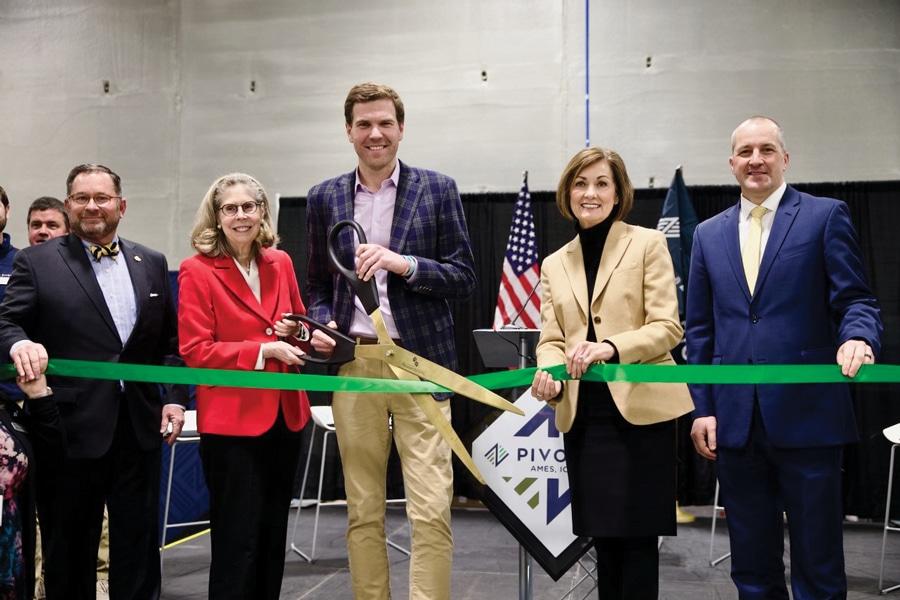
Pivot Bio CEO Chris Abbott, center, cuts the ribbon on the company’s new stand-alone customer success facility located in the ISU Research Park during an event in February. Submitted photo
Pivot Bio: Chris Abbott, CEO
Pivot Bio is an agtech startup that was founded in Berkeley, Calif., in 2011. It aims to help farmers replace their synthetic fertilizers through nitrogen-based technologies and solutions. When Pivot Bio was ready to commercialize its solutions, it decided to base its commercial and customer service operations in Iowa, opening its first office in the ISU Research Park in 2019. It then moved into a larger space in 2021 and last month opened a 36,000-square-foot, $14 million Customer Success Center in the research park. Pivot Bio has 75 employees in Iowa in addition to over 150 independent sales representatives. The company’s headquarters remain in California. Chris Abbott was named Pivot Bio’s new CEO in August 2023.
Why was Pivot Bio started and what problem is it working to address?
When our co-founders, Karsten Temme and Alvin Tamsir, started Pivot Bio, they saw a future where farmers are empowered to use fertilizers more sustainably and efficiently. That vision is now the basis of the company. We have commercialized crop nutrition technologies that harness the power of nature to deliver nitrogen to crops in a way that boosts productivity without the harmful unintended consequences of synthetic fertilizer.
Explain Pivot Bio’s solution or technology and how it works.
Pivot Bio developed the first nitrogen-fixing microbes for cereal crops, creating a more reliable, predictable and sustainable way to nourish crops. Our technology enables microbes to convert atmospheric nitrogen and deliver it to crops, providing a source of nitrogen throughout the growing season. Our team of advanced scientists and researchers identified nitrogen-fixing microbes naturally present in the soil, enhanced their strengths and rigorously tested their efficacy. Our microbes consistently and efficiently replace up to 40 pounds per acre of synthetic nitrogen while maintaining — and, when nitrogen is the yield-limiting factor, improving – yield.
What makes the solution sustainable? What effects does it have on sustainability in Iowa and beyond?
Our manufacturing process produces 98% less greenhouse gas emissions than synthetic fertilizer and uses 1,000 times less water. Pivot Bio’s solution is also sustainable because it directly tackles the inefficiencies and environmental issues associated with synthetic nitrogen use. Only 40% to 60% of synthetic fertilizer ever reaches the crop, and the rest can leach, volatilize or run off into the environment. Our gene-edited microbes fix atmospheric nitrogen and deliver it to the roots of crops to provide a more reliable and consistent nitrogen source. This approach significantly reduces the common losses associated with synthetic fertilizers, such as nitrous oxide emissions and ammonia volatilization. Collaborations with institutions such as ISU have validated our technology’s ability to decrease nitrate leaching and enhance soil health. In 2022, our products helped customers avoid approximately 226,400 metric tons of carbon dioxide equivalent across more than 3 million acres – similar to meeting the electricity needs of 44,000 U.S. homes for a year. We’re excited to be releasing updated results from 2023 in the next few months.
What has Pivot Bio’s growth and expansion looked like since its founding?
We’ve gone from around 100,000 trial acres to over 5 million acres in just four growing seasons. It’s exceeded our most optimistic projections. We’re in a stage now where we are transforming from a large startup that has found a product-market fit to a growth company. Some of the things fueling our growth are our on-seed nitrogen application, which allows growers to plant a corn seed with up to 25% of their nitrogen needs already met for the season. We recently inaugurated our new Customer Success Center, nestled within the ISU Research Park. With about 15,000 square feet of open high bay, this facility provides ample space for research and education, and it serves as a hub for personalized support and technical expertise. Our investment in new facilities, including a development and manufacturing center in St. Louis, Mo., and a distribution hub in Omaha, Neb., enable us to deliver a better form of nitrogen to farmers across the Midwest and beyond, ensuring our products are readily available and scalable. Over the last five years, it is clear our growth and continued expansion have been and will continue to be characterized by a steadfast commitment to empowering farmers and addressing the pressing challenges facing modern agriculture.
What is a challenge or outside factor that affects your company as a startup?
In any industry, it comes down to gaining trust with customers. We’re laser-focused on creating a great customer experience and bringing our customers technology and tools that improve their ROIs. For example, we recently announced the success of our first-of-its-kind nitrogen credit program N-OVATOR, which has paid out over $6 million to enrolled farmers since 2022. We expect this program to grow significantly in the coming years.
In your experience, what have you found are important factors to consider or resources to starting and building an agriculture company working in Iowa?
Opening our commercial business in Iowa was a natural fit for Pivot Bio. Ames, with its proximity to leading agricultural companies and ISU’s renowned ag research programs, provides an ideal setting for our Midwest-based customer success center. Being in Ames offers us access to a rich talent pool and allows us to tap into the expertise of agricultural leaders who call Iowa home.
Additionally, building strong relationships with local farmers and agricultural organizations has been essential. Understanding their needs, challenges and priorities has helped us tailor our solutions to meet their specific requirements. Leveraging Iowa’s agricultural heritage and supportive ecosystem has provided us with invaluable resources and support as we continue to grow and expand our operations.
Overall, starting and building an agriculture company in Iowa is about leveraging the state’s unique strengths, including its rich agricultural heritage, world-class research institutions and supportive community of industry stakeholders. By staying connected to the farming community and embracing the collaborative spirit of Iowa, we’ve been able to lay a solid foundation for our growth and success in the agricultural industry.
Do you see barriers to prioritizing sustainability as a business or starting a business with a sustainability focus in the agriculture industry? If so, what are they?
We’re seeing sustainability as a tailwind right now. Through the N-OVATOR program, we are able to monetize the sustainable impact our customers are having and return to them at the end of the season a quarter or more of what they paid for our product. It changes the ROI calculation entirely.
What is an area of focus for Pivot Bio or an opportunity it hopes to build on in the near future?
We’ve had products on the market for a few years now, and our customers are telling us, “We understand that your product works, now help us use it better.” For example, we’re focusing on advising on what type of fertilizer to replace and when to maximize efficiency, bringing complementary solutions to growers and expanding our library of trial results to advance crop-nutrition science. We’re not going to be able to do that alone. Our focus now is building lasting and impactful partnerships that will help us accomplish mutual goals.
What do you think stakeholders in Iowa can do to foster a sustainability focus long-term?
We believe sustainability will grow if we are all open to innovation and collaboration. The tools exist to create an enormously productive and sustainable food system. But existing is not enough. Now we need to get them into the hands of farmers as part of a holistic system of production. That’s a big task that will take many of us working together.

Sarah Diehn
Sarah Diehn is editor at Business Record. She covers innovation and entrepreneurship, manufacturing, insurance, and energy.

